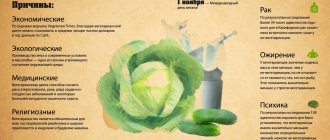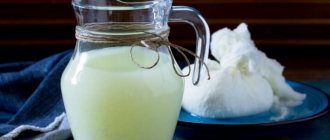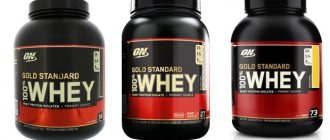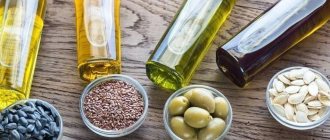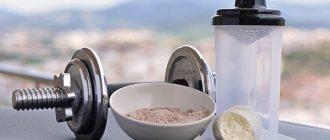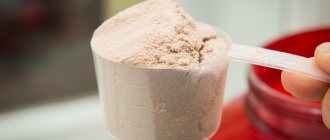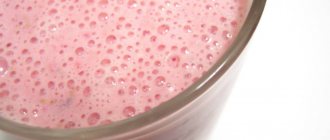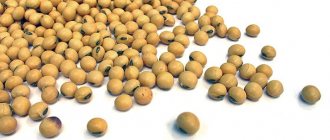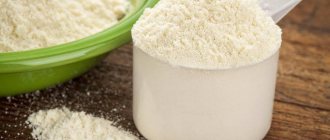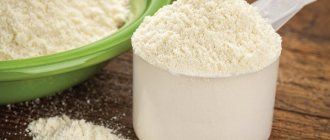Home ▸ Articles ▸ Sports supplements ▸ Proteins ▸ Everything about plant protein
There is a stereotype about vegetarians. They say they don’t eat anything at all and can be carried away by the wind.
This opinion is especially widespread among bodybuilders and other athletes, who are confident that great strength and big muscles are impossible without meat.
But muscle growth depends on the amount of protein contained in meat, and protein is also found in plants: peas, rice, hemp seeds. However, plant sources of protein are not as rich in protein as animal sources, and their amino acid set is not as complete.
How much protein do we need?
The amount of protein we need daily depends on our goals and activity level. For a person of normal weight (for a woman this is 64 kg) with a sedentary lifestyle, it is enough to consume a little more than 50 grams of protein per day.
But people who play sports have completely different protein needs. The International Society of Sports Nutrition (ISSN) recommends consuming 1.4-2 grams of protein per kilogram of body weight per day when doing strength training. Thus, an 82-pound person lifting weights should provide 115-164 grams of protein daily.
And many nutritionists talk about even more if you are seriously involved in powerlifting or bodybuilding: up to 1 gram per 0.5 kg of weight.
If you are on a diet, you will need even more protein: 2.3–3.1 g/kg body weight. For example, a person weighing over 200 pounds will need to consume 210-280 grams of protein per day to maintain muscle mass while burning fat.
The bottom line is that the more protein, the more difficult it is to get it from food, and you have to resort to protein supplements. Especially if you are a vegan or vegetarian who gets their protein from high-carbohydrate foods such as beans, rice, and quinoa. Indeed, in this case, by increasing the amount of protein, we increase the number of carbohydrates entering the body and add calories to our diet.
Thus, protein supplements are indispensable when it comes to achieving certain dietary and sports goals. They also help us out if we don’t have time to prepare certain foods.
Features of Vegan Protein
There are many food products containing a sufficient amount of protein per 100 grams, but not all are used in production to obtain a high-quality dry product. Since the only source of protein for vegans is plant foods, food industry and sports nutrition technologies have come to the production of high-quality protein shakes enriched with amino acids and vitamins from soy, legumes, grains and plants. Some of them have a low amino acid profile, are either less digestible, or it is completely impractical for companies to extract protein from certain plants and crops.
What are the benefits of plant-based protein supplements?
High-quality plant proteins are in no way inferior to animal proteins - whey, casein, egg and beef protein powders, and in some ways even superior to them.
Comfortable digestion
Most plant proteins are easily and almost completely digestible. For example, the digestibility level of pea protein is 94%, and rice protein is more than 90%. It is even known that rice protein is easier to digest than whey. And hemp protein, according to recent data, can replace “night” casein protein, since, similar to casein, it slowly releases amino acids in the body.
In addition, the good digestibility of vegetable protein will relieve you of the feeling of bloating in the abdominal area and flatulence.
Low allergenicity
Compared to the allergenicity of milk and dairy products, eggs and soy, plant proteins can be called hypoallergenic. Thus, pure pea and rice proteins are known to be free of allergens.
Environmental friendliness
Plant proteins require fewer natural resources to produce than whey and casein. And unlike cattle, plants don't release carbon into the atmosphere or pollute waterways.
Types of Protein Purification
The amount of protein in a protein powder depends not only on the type of protein, but also on the degree of purification of the protein. There are three main types of protein purification:
- Protein concentrate
is the lowest degree of purification of raw materials. This “gentle” processing determines the amount of protein in the final product from 29% to 89%. Such proteins contain the most minerals and nutrients. - Protein hydrolyzate
- highly hydrolyzed proteins containing 90% protein. They are well absorbed and contribute to the rapid gain of muscle mass during training. - Protein isolate
- undergoes the highest degree of purification, retaining up to 95% of the protein. They practically do not contain fats and sugars; they are popular during the drying process as an additional source of highly digestible protein.
How to Make Plant-Based Protein as Effective as Whey
Whey protein is generally considered the gold standard for protein supplements due to its complete amino acid profile, bioavailability, and rapid absorption. But plant protein powders can be just as good as whey protein powders, especially if you combine them.
But you will have to combine it if you want to get a full set of amino acids with a protein shake. Pea protein, for example, contains all nine essential amino acids but is low in methionine and cysteine. Rice protein also contains all the essential amino acids, but is low in lysine. If you mix pea and rice proteins or buy a product that already combines them, problem solved!
Other options for protein products that mix different types of plant protein:
- Green (Steel Power Nutrition) 900 g
- Protein drink Cyber Shake (Bite)
Alternatively, you can also consume the protein shake along with food rich in the missing amino acids. By the way, pumpkin and watermelon seeds are sometimes added to plant-based protein mixtures as an inexpensive and reliable way to complete their amino acid profile.
One of the outstanding features of whey protein is its leucine content. Leucine is a branched chain amino acid (BCAA), and scientists believe it is more important than others for muscle growth.
Whey protein contains the most leucine, but it is also found in plant-based protein supplements, and mixing 2-3 scoops of soy, rice, pea or hemp protein into a shake versus 1-2 scoops of whey will give you the same result.
And some plant-based protein supplements have extra leucine added to fill the gap, so you don't have to use more of the product to get the same amount of the important amino acid.
Experiments from four years ago show the same effect of plant proteins (pea and rice) and whey on the performance of athletes. Both groups—the plant protein group and the whey group—had similar results in muscle size, body composition, and strength.
Myths about protein
Myth 1. Protein is chemicals and steroids.
Protein is a protein, a necessary building material for the cells of our body and the most popular sports supplement.
Myth 2. You should drink protein only after losing weight, because it makes muscles grow.
Protein is concentrated protein that has been dried into powder. It should be taken if you are lacking protein. By itself, nothing will grow from protein; it can be taken both when losing weight and when building muscle mass.
Myth 3. Protein is for women and for men.
Protein, like fats and carbohydrates, is not divided by gender. If they are trying to sell you a protein powder “especially for women,” this is just marketing. Carefully study the composition to choose a quality product without reference to gender.
Myth 4. Protein will help you build huge muscles.
Only exercises to strengthen your muscles will allow you to pump them up. At the same time, the body requires more protein to build muscle tissue. Without regular exercise, a protein shake will not make you an athlete or a muscle man.
Myth 5. Protein is addictive.
Neither proteins, nor carbohydrates, nor fats, nor any other vitamin complexes can cause addiction even when taken in large quantities. These are the same nutritional sources as a bunch of lettuce or baked beans.
Myth 6: Protein is bad for your kidneys.
If your kidneys did not bother you before you started taking protein, then after taking it there will be no harm to them. Any product in excess (sugar, fatty foods, flour), including protein, can cause harm. Be sure to follow the dosage and stay healthy.
Myth 7. Only jocks eat protein.
Each of us consumes protein, even if we do not take any nutritional supplements. Protein (protein) is contained in almost every product in greater or lesser quantities. Under high loads, the body needs more protein to build muscles. If there is not enough of it in your diet, it is recommended to take protein in the form of protein shakes.
Myth 8: Protein should only be taken during training.
Some types of amino acids work better during high physical activity. Others help actively build muscle while you sleep. Read more about this in the article about BCAA. But in general, our body can receive protein at any time of the day. The most important thing is to observe the proportions and time frames in which he can absorb more protein than at other times.
Myth 9. Protein can replace regular food.
Protein is an additional source of protein for the body, a sports supplement that replenishes its norm in the diet. In no case can it replace a nutritious meal containing the carbohydrates, fats and vitamins necessary for the body. But thanks to the high nutritional value of protein, a protein shake can reduce hunger, which shouldn't discourage you from eating right.
Myth 10. Plant protein is worse than animal protein.
Vegetable protein is better tolerated by the body and less allergenic. In some cases, the set of amino acids may be inferior to proteins from animal sources, but modern manufacturers of plant proteins create a complete amino acid composition by adding different types of protein, which makes such mixtures more environmentally friendly and comfortable for consumption.
Why plant protein is good for weight loss
Increasing your protein intake of any kind is always a health benefit, not least for promoting weight loss. Protein is highly nutritious and helps control appetite. We also need to burn a lot of calories to digest protein.
A study conducted by the American Journal of Clinical Nutrition found that overweight people who ate more protein (whether plant or animal) lost the same number of pounds.
It is noteworthy that of all plant proteins, pea protein is the most nutritious. In a food log study, subjects consumed equal amounts of casein, whey, pea protein, egg albumin, a carbohydrate drink, or water 30 minutes before meals. And pea protein was ranked second after casein in reducing appetite.
Disadvantages of Protein for Vegetarians
Whatever one may say, plant protein contains an inferior amino acid profile. And this is the main and most significant disadvantage.
To compensate for this deficiency, sports nutrition manufacturers produce multicomponent plant proteins. They are formulated with multiple plant-based protein sources to complement the amino acid profile.
But the practical use of any plant proteins in bodybuilding still loses.
If the protein content is the same as in concentrates of animal origin, then there are questions about absorption.
Milk protein is absorbed almost completely, soy and rice by 80%, and other plant proteins are limited to the range of 50-70%. It all depends on the body of a particular person.
The absorption rate is also not the highest. Let's add to this the specific taste of some types. For example, pea.
In addition, the image of plant proteins has suffered as a result of a study that claimed that soy protein in large quantities suppresses the production of testosterone in men. In parallel with this, increasing the production of female sex hormones - estrogens.
Other scientists did not obtain such results in their experiments, but they also failed to refute the sensational statement.
What to Look for in a Plant-Based Protein Supplement
A quality plant-based protein supplement should have between 100 and 150 calories per serving and contain at least 15 grams of protein with some fat. Since plants are carbohydrate foods by nature, it is normal for plant protein supplements to have three to five grams of carbohydrates per serving, but they should not contain sugar.
To make sure you're getting all the amino acids your body needs to stay active, look for a powder that includes multiple plant proteins, such as pea and rice or seed proteins.
Vegetable protein with digestive enzymes is also good. A 2015 study found that ingesting enzymes along with a pea and rice protein blend improved protein absorption, bringing it closer to the rate at which whey concentrate is absorbed into your muscles.
Animal and plant - what's the difference?
There are two types of protein by origin - animal and plant.
Any product containing protein contains a certain set of amino acids. There are a total of 20 amino acids, which are divided into essential and non-essential.
Essential amino acids are more important for the body, since they cannot be synthesized in the body and must be supplied daily with food.
Replaceable ones are also necessary, but their consumption is not so critical. This group is synthesized in the body with the help of other amino acids.
This leads to the following conclusion:
From a nutritional point of view, the most important are protein foods that contain all the essential amino acids.
These products include animal proteins: meat, fish, poultry, eggs, milk and dairy products.
Plant-based foods do not contain all essential amino acids.
The greatest amount of protein is present in the following plants:
- Soybeans
- Lentils
- Chickpeas
- Peas
- Quinoa
Some types of nuts are also rich in protein, although they are more likely to be fat.
Nutritionists and vegetarians say that by eating a variety of plant foods, you can achieve a balanced amino acid composition in your diet.
This is theoretically possible for people who are not involved in sports, but is of little use for bodybuilding purposes. Indeed, in bodybuilding, in addition to the quality composition of the protein, its quantity is also important.
If you try to gain protein levels (which are higher in athletes) using only plant foods, while balancing it with amino acids, you will have to eat a huge amount of such food every day.
To solve this problem, the sports nutritional supplement industry created plant-based protein in the form of a powder concentrate.
The best protein on the market – which one to choose?
Today's market is simply replete with protein-based dietary supplements. Moreover, if you read the label, then one is more beautiful than the other. Such a wide choice will confuse even bodybuilding veterans, let alone beginners. How to figure out which protein is best for you? To do this, we have compiled the top proteins based on reviews, price, purpose of use, taste, effectiveness and other features of the product. We evaluated all the products soberly, noting both their pros and cons, so on our list you will definitely find the drug that will solve the problems of your body specifically.
Diet of a vegan athlete: must-have foods and supplements
There are many champions in the sports world who have given up meat. Here are just a few names:
- Mike Tyson
- Serena Williams
- Frank Medrano
- Kate Holmes
- Bruce Lee
- BJ Armstrong
Also worth mentioning is Mike Mahler, a world-renowned kettlebell lifting trainer who follows a vegan diet.
The diet of a vegan athlete should be enriched with protein. The norm for an adult is his weight multiplied by a factor of 0.8. With intense loads it can increase to 1-2 g per 1 kg.
Because Since vegans do not consume eggs or milk, they have to look for protein in other foods. Traditional protein shakes and most ready-made mixtures are not suitable for them. The latter contain traces of animal origin.
But this does not mean that plant-based protein for vegans comes only from vegetables, fruits and grains. Athletes should pay attention to analog products made specifically for vegetarians and vegans.
- Plant milk. It is made from soybeans, coconut, nuts (almonds). Yogurts and cheese are made on this base. You can find oat and buckwheat milk in almost every supermarket - it is cheaper than almond and soy milk.
- Special additives (analogues of ready-made protein mixtures). They are labeled vegan and contain no traces of lactose or gluten. Accordingly, there are fats, a minimum of carbohydrates and sugar.
- Vitamins. They are developed without components of animal origin, gelatin, and iron. The last element in the pharmaceutical industry is obtained from animal hemoglobin, which is unacceptable. Many well-known brands have pet-friendly products.
Benefits of protein for the body
Protein in our body serves the following purposes:
- metabolic processes – ensuring proper metabolism in the body;
- immunity - proteins are the antibodies that protect us from infections and viruses;
- transportation – strengthening the circulatory system, protein delivers useful substances to every cell of our body;
- building material - these substances are the basis of cellular structure;
- energy – 1 gram is equal to 4 kcal, but the body begins to use protein storage when the supply of carbohydrates runs out.
Our body does not produce protein on its own, but takes it from food. People who eat poorly and irregularly, engage in sports or mental activity may not receive it in the required amount.
Without receiving the daily protein requirement, the body begins to become depleted. To avoid this, you need to balance your diet.
Protein Inka Inchi
This protein is made from the star-shaped Inca Inchi seed (sometimes called the nut), which is grown in Peru. Due to its relatively limited supply, it costs more than regular protein powders ().
A 28-gram serving of Inca Inchi Protein contains about 120 calories and 17 grams of protein, depending on the brand. It is a good source of all essential amino acids except lysine (,).
Despite this limitation, when a small group of people were given 30 grams of Inca Inchi protein, it had as good an effect in supporting protein synthesis in the body as the same amount of soy protein powder ().
In addition, Inca Inchi protein is a particularly good source of the essential amino acid arginine, which your body uses to produce nitric oxide.
Nitric oxide helps dilate your arteries, improve circulation and lower blood pressure ().
This unique vegan protein also provides the omega-3 fatty acid ALA, which supports heart health (,).
Summary:
Isolated protein from the Peruvian Inca Inchi seed is a good source of all essential amino acids except lysine. It also contains compounds that promote heart health, including arginine and the omega-3 fatty acid ALA.
The best whey protein in hydrolyzed form
To synthesize hydrolyzate - a protein broken down into amino acids - you need special knowledge and professional equipment. Not every manufacturer can cope with this task. Therefore, we return again to Optimum Nutrition, in particular to its creation Platinum Hydro Whey. The best premium protein is characterized by:
- high BCAA content;
- the presence of seven food enzymes that catalyze the breakdown of complex substances and prevent the appearance of heaviness in the stomach;
- instant absorption;
- a wide selection of flavors (7 options (among them there is even Red Velvet cake), which is a lot for this type of protein);
- excellent solubility in water.
There are no disadvantages. Even the cost (as for hydrolyzate) is within normal limits.
Another top protein in its category is BioTech Hydro Whey Zero, which provides consumers with:
- an additional portion of L-arginine - an amino acid that dilates blood vessels and thus improves the trophism of muscle tissue and promotes pumping;
- nutrients even if you are lactose or gluten intolerant;
- four excellent tastes that completely mask the bitterness inherent in hydrolyzate with the help of the most useful sweetener - stevia;
- not only in large packages, but also in small samples, allowing you to check the effectiveness of a specialized additive and select the taste.
